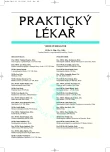Emergency resuscitation in the front line
Neodkladná resuscitace v první linii, poskytovaná praktickými lékaři pro dospělé, praktickými lékaři pro děti, stomatology, ambulantními specialisty, farmaceuty, zdravotními sestrami a fyzioterapeuty Stanovisko České rady pro resuscitaci
Autoři článku představují zdravotnické veřejnosti Evropskou radu pro resuscitaci a její program, který je u nás postupně zaváděn do praxe prostřednictvím České rady pro resuscitaci. Seznamují zdravotníky s obsahem a cíli základní podpory života (BLS), rozšířené podpory života (ALS) a dětské podpora života (EPLS). Popisují rozsah nezbytných znalostí a dovedností, které by měl ovládat každý zdravotnický pracovník (zajištění volných dýchacích cest, uvolnění dýchacích cest zapadlým jazykem i při obturaci cizím tělesem, umělá ventilace ručním dýchacím vakem s maskou a rezervoárem kyslíku, zavedení ústního, popř. nosního vzduchovodu, zvládání techniky nepřímé srdeční masáže, použití automatizovaného externího defibrilátoru (AED), zajištění periferního žilního vstupu). Dále rozebírají možnosti týmové práce při provádění resuscitace. Doporučené úkony základní podpory života může úspěšně provádět i jeden zachránce. Vzhledem k nesporné fyzické náročnosti správně prováděné neodkladné resuscitace – zejména provádění nepřímé srdeční masáže – je výhodné, mohou-li se zachránci při resuscitaci střídat. V naprosté většině případů se o přežití pacientů s náhlou zástavou krevního oběhu a dýchání, k níž došlo ve zdravotnické etapě nazývané „první linie“, rozhoduje v prvních minutách po jejím vzniku. Proto v závěru článku autoři doporučují, že by teoretické přípravě a nácviku praktických dovedností zdravotníky první linie měla být věnována mnohem větší pozornost než dosud.
Klíčová slova:
neodkladná resuscitace, základní a rozšířená podpora života, zajištění dýchacích cest, defibrilace, týmová práce, Česká rada pro resuscitaci.
Authors:
J. Pokorný Jr.; V. Mareček; J. Dizon; J. Růžička; R. Červený; V. Di Cara
Published in:
Prakt. Lék. 2006; 86(9): 491-493
Category:
Reviews
Overview
The article outlines the activities of the European Resuscitation Council, which are being gradually introduced in the Czech Republic through the Czech Resuscitation Council. It acquaints health professionals with the steps and aims of basic life support (BLS), advanced life support (ALS), and paediatric life support (EPLS). It details the skills that every health professional is expected to have (checking the airway is open, clearing the airway of the victim’s tongue or other visible obstruction, bag-mask ventilation, oral or nasal intubation, chest compression techniques, use of an automatic external defibrillator (AED), securing peripheral venous access). The possibilities of teamwork during resuscitation are further discussed. The guidelines for basic life support may be carried out successfully by one rescuer; however, to prevent fatigue – especially whilst performing chest compression – it is advantageous if more than one rescuer is present so that they can take it turns. For the majority of patients with acute cardiac arrest, survival is dependent upon the first few minutes in the stage termed “the front line”. With this in mind, the authors recommend that more attention be given to theoretical and practical training for health professionals in the front line than is currently the case.
Key words:
emergency resuscitation, basic and advanced life support, clearing airways, defibrillation, team work, Czech Resuscitation Council
Labels
General practitioner for children and adolescents General practitioner for adultsArticle was published in
General Practitioner

2006 Issue 9
- Advances in the Treatment of Myasthenia Gravis on the Horizon
- Hope Awakens with Early Diagnosis of Parkinson's Disease Based on Skin Odor
- Memantine in Dementia Therapy – Current Findings and Possible Future Applications
- Memantine Eases Daily Life for Patients and Caregivers
- Possibilities of Using Metamizole in the Treatment of Acute Primary Headaches
-
All articles in this issue
- Prevention of diseases using modern information technologies – interactive web pages and their effect
- Emergency resuscitation in the front line
- Red blood cells transfusion in critically ill from the point of view of evidence based medicine: new limits, new risks?
- What have the new recommendations for cardiovascular disease prevention in adults taught us – is it necessary to recalculate a previously assessed risk?
- Tandem Heart used for treatment of the most severe forms of heart failure – left ventricular support
- Chronic viral hepatitises and their health and social aspects at general practitioner
- Epiglotitis – The Experience with patients hospitalized in RES FN Motol
- News in treatment modalities of hypertension
- Non-setroidal anti-inflammatory drugs – use in treatment of cardiovascular disease an cardiovascular risks
- Oral anticoagulant therapy
- General Practitioner
- Journal archive
- Current issue
- About the journal
Most read in this issue
- Tandem Heart used for treatment of the most severe forms of heart failure – left ventricular support
- Oral anticoagulant therapy
- Epiglotitis – The Experience with patients hospitalized in RES FN Motol
- Non-setroidal anti-inflammatory drugs – use in treatment of cardiovascular disease an cardiovascular risks
